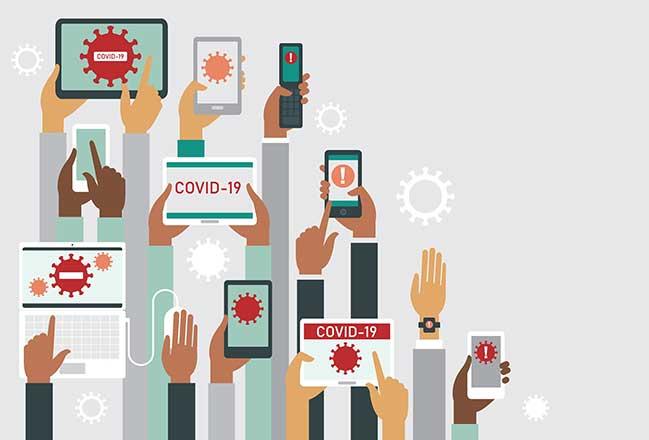You are here
How the pandemic impacted digital high-tech
By Jean-Claude Elias - Dec 24,2020 - Last updated at Dec 24,2020

Photo courtesy of wordpress.com
It is almost the end of the year, and as usual, we take a little time to look back at all that happened in the last 12 months. Whereas the major, single big event has been and is still the COVID-19 crisis, what is of interest for this very column are not the direct but the indirect consequences of this unprecedented pandemic — namely the impact it has had on the world of high-tech. Or, to put it in other words, the impact that digital technology has had on the situation.
From being more or less dependent on computers and networks, we became heavily dependent on them. Suddenly they were a vital cord, a matter of survival and this is no exaggeration. No one can deny that without digital technology and IT tools and devices the situation would have been even more dramatic, more disastrous than what it is.
There is hardly one field that was not affected and that desperately needed fast Internet, laptop computers, quality webcams and microphones. New software applications had to be designed, developed, and made available overnight. There was, and there still is, the need for certain categories of people, to learn how to better perform online work, participate in e-meetings, take e-learning, etc. The prefix “e-“ was added to the countless tasks that were moved to online platforms. Parents (and probably educators too) had to take tranquilisers to cope with the idiosyncrasy of remote learning.
Retail stores that sell consumer computer equipment were in short stock. In general, those working in the IT field were the busiest people in the entire trade business.
Fortunately, a lot had already been made in the past five years or so in terms of doing more online and of preparing the population to the move. The Jordanian eFawateercom online payment system for services is saving citizens precious time and money, reducing transportation cost and hassle.
Online banking is now the norm and most, though not all, of the formalities that you would do at Greater Amman Municipality (GAM) can now be done online. For certain types of the processes with GAM and that involve renewing work permits for non-Jordanian workers, you still have to do it by going in person to the labour office. Admitted, the fact that other types of permits, like for instance those for house helpers and agricultural workers, are done online, has significantly reduced the congestion and the crowds that one would see at the Labour office for the remaining types.
The lesson to be learned, if any, is that investing in IT resources pays off. Whether you pay more for a large computer monitor, a high-definition webcam, larger hard disks, a faster laptop, more cloud storage, or for good IT support and more Internet bandwidth, or to upgrade existing software, it is always money well spent in the end. You feel it and you experience it all the time, but even more so in trying times like the current pandemic.
Remote access software, in particular, has proven to be very useful when you have to serve clients remotely, or simply help a less tech-savvy friend, and must access their computer without going to them personally. Applications like AnyDesk and TeamViewer come to the rescue time and again, allow IT tech teams to solve clients problems in a quick, efficient, and before anything else, safe manner.
For those not familiar with them, AnyDesk and TeamViewer are light, easy-to-use software applications that let you work on a remote computer, whether to fix it, to install software, to upgrade it or to show its owner how to do this or that task, without leaving your desk. In times like these, this is priceless.
I am simply curious to know what I will have to look back at next year, around the same time.
Related Articles
It is a situation that probably only exists in the world of Information Technology (IT).
The number of online tasks and activities is growing, it’s understood, but how far can it all go?
Despite some complex issues, other elusive, not to say obscure questions such as the dark Internet, virtual currencies, the blockchain syste
















